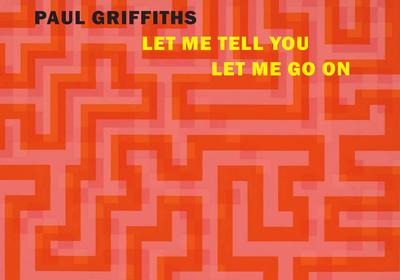-

-
The Discerning Mollusk's Guide to Arts & Ideas
-


let me tell you and let me go on
Paul Griffiths
NYRB, Apr 2025
he appears on stage five times only. An innocent, she’s vulnerable. Men carve out the path she walks until her lover dumps her and her father is killed. Traumatised, she takes her own life, or is drowned accidentally. Shakespeare rigs an open verdict.
Ophelia’s pre-scripted life, all downhill from the start, has long attracted feminist readings and retellings—from Elaine Showalter’s pioneering rethink in the 1980s to Lisa Klein’s radical revision of her life for teenage girls—which celebrate the trampled ‘rose of May’ as a figure of resistance.
In Let Me Tell You and Let Me Go On, Paul Griffiths draws on the metafictional energies of Becket, Borges and Calvino—a pivotal trio who stretched storytelling in unprecedented directions—to deepen and further extend Ophelia’s recovery.
Griffiths empowers Ophelia to speak for a second and third time, voicing—in her own words—a raw, disturbing prequel and a spine-tingling sequel to the last few weeks of her life glimpsed in Hamlet. Griffiths identifies 483 words spoken by Ophelia in the Second Quarto and First Folio editions and the revivified narrator speaks with those alone.
It’s reasonable to expect that a limited, self-denying lexicon will quickly become monotonous, crude and clumsy, and unable to deliver nuance and subtlety. The fewer the words, the greater the tongue-tied dullness, surely? Force-fitted phrases will mask events. One can hear the objections: isn’t writing in this way merely mosaic making—or perhaps plumbing, as Ballard once described William Burrough’s use of cut-ups.
Not here, not in the virtuoso hands of Paul Griffiths. His Ophelian monologues recast and add fresh mystery to a tragedy most of us think we know. A nuncannily familiar voice unfolds; a reconstellation of Ophelia, perhaps of Hamlet as a whole, is set in motion. From the opening lines a tension between received language and the act of speaking is foregrounded as central: “So now I come to speak. At last. I will tell you all I know. I was deceived to think that I could not do this.” Uncluttered storytelling, small differences, creative recombinations and new disclosures follow. Surprise and insight accumulate. An intertextual polyphony—words which were expected, and some which were not, all resonating with remembered readings, and half-recalled performances—soon sounds from the page.
Don’t be surprised this is so. Have you forgotten how, as children, we thrilled to Green Eggs and Ham, in which Dr Seuss riffed quickfire, wondrous comic changes from only fifty words? Permutational performance is an adult pleasure too– in poetry, where it is fundamental to the villanelle and sestina, for example, or in the French nouveau roman, most notably in Robbe-Grillet and Claude Simon’s repetitions intensified by variation.
In these paradoxical monologues, Ophelia reworks her script and finds fresh voice, much changed yet much the same. She is no longer passive: “I have come to see that my path up to now was a path made for me—and it could go on. I do not like it, and I will not take it. More and more I know where it goes.” In Let Me Tell You she is prescient about the limitations and restricted choices which lay ahead in the play, mirroring but also contrasting with her author, whose constraints are voluntary and options more numerous. Griffiths’ Ophelia knows she is rooted in relations of language and power, and that she will remain enmeshed within them. She is clearly a fiction. A troubling question arises: is the reader too? An unusually self-aware reading experience—more alert to one’s literary endowments, to echoes and returns, to absences and other possibilities—indeed to our shaping by writing—ensues.
Some of the unsayables are revealing. Famously, Ophelia was never given the word mother by Shakespeare. To backfill the gap a remote and forbidding “she”, “the lady”, “the other one” is assembled. She was an unloved, neglected child. Ophelia’s subjectivity is transformed.
Because ‘said’ is also missing from her lexicon, tenses become mysterious. Reported speech becomes tantalisingly conditional, habitual, or imperative: she would say, he had to say. Why? New questions arise.
This circling, recycled voice realises it has limited free will and agency. Friends tell her “My tongue is not my own.” At the same time she has a renewed sense of possibility, parallel to that of the author: “What should I do? Which path should I take? This way, that way?”
This sense of contingency—that everything might be otherwise, and can be made so, while recognisably persisting—is what propels much of Griffiths’ fiction, from his first novel Myself and Marco Polo (1989), subtitled ‘a novel of changes’, in which a cellmate of the celebrated Silk Road traveller becomes his ghostwriter. As the two bunkies quarrel about art, religion and philosophy—broaching the issue of whether “infinite alternatives must be countenanced as a part of reality”—Rustichello fakes and fabricates much of the famous fourteenth century memoir.
The Lay of Sir Tristram (1991) took the legend of Tristan and Iseult back to basics—a woman weeping, a boy on the shore—reopening the story’s possibilities with inversions and reversals, other tellings and critique: “He is back on land, but different land . . . This is a story about a boy weeping, a weeping boy. No. He is walking gaily along a woodland path.” Headings include: “VII. A problem, with four possible solutions”, an episode in which each paragraph offers an alternative to its precedent.
Mr Beethoven (2020) was a counterfactual game of what-iffery in which the composer was sent to a country he never visited to compose an oratorio he never wrote. The mode was closer to traditional historical fiction than his previous work, and gently buttressed with social and psychological realism, but Beethoven’s words were all selected from documentary sources, and the narrative voice, true to form, considered changes in direction and focus as it unfurled.
The Ophelian texts relinquish the realist safety rail. They are less tessellated and likely to unravel at any moment than the early novels. They are also, in places, surreal. At one point, make-do ingredients generate a mouth-watering menu which includes “Valentine’s Eyes”, “Heart of Owl with rose honey” and “Twice Turned Shoulder of Young Robin.” Memorable metaphors are struck from what’s to hand: “That mountain: it was a green sandal loosed from heaven.” Having no access to ‘toes’, Ophelia may not tiptoe: she walks “heels raised up as we go”, an awkwardness enhanced by scarcity.
As no other hue is available, the palette contracts to green. Griffiths thrives on such shortages. On a games board “one of you must play green, the other the other.” That may irritate some readers but the workarounds usually combine comedy and insight. It’s one of many ways in which the voluntary constraint upon the writer becomes palpable and shared, a pleasure for the reader too. Anachronisms pile on the fun: who knew Ophelia had a Beatles song within her, and the first draft of the pop ballad Delilah?
The song-bursts are significant. The author is associated with Oulipo, an evolving troupe of writers who deploy strict rules to generate and shape texts. I suspect this isn’t the main, or only, driver of his choices. Griffiths is a distinguished authority on contemporary classical music. Music informs his writing practice. We are being led astray when Ophelia informs us “If you wish to have music, you must tear yourself away and go from here.”
One can, as it happens, ‘go from here’ to a Hans Abrahamsen song cycle in which the aurally dazzling soprano Barbara Hannigan sings a variant of the Let Me Tell You (Winter and Winter 9102322, 2016). I strongly recommend you do. And lend an ear to Griffiths himself, reading an early draft of the text accompanied by the acclaimed two-bow cellist Frances-Marie Uitti on There is Still Time (ECM New Series 1882, 2004)
Luciano Berio’s opera A King Listening, with its non-linear libretto by Calvino, is an obvious forebear. An isolated and declining ruler—Shakespeare’s Prospero reimagined as a theatre director—hears despair being voiced in his palace, along with rehearsals for a performance of The Tempest. Messaien’s limited transpositions foreshadow Griffiths’ rearrangements, as does the formula composition used by Stockhausen for his avant-garde opera Donnerstag, and Cage’s prepared and constrained pianos. But I am most reminded of the copresence of music and text in some medieval monastic choirs, where the meditative singing of as many as three doctrinal texts at the same time took place. Might this sung sharing and overlaying and repatterning of valued texts have had something in common with our experience of reading Ophelian, or Myself and Marco Polo or The Lay of Tristram with the original in mind?
Quite possibly. For overlay, simultaneity and intersections between texts are a focus of The Tomb Guardians (2021) which was published in England between the two Ophelian texts. Two conversations about the night Jesus left his burial chamber, separated by two millenia, are interpolated. In one, a pair discuss paintings of men believed to be the sentries by the tomb. In the other, the guardians themselves debate the events of the night: sleeping while on duty, the disappearance of one of their number, the rolling away of the stone, possible punishment. Both discussions throw light on the biblical story and puzzles it contains. The fun lays in the jump cuts between the two conversations. Lines from one are transposed or echoed in the other; often the dialogues appear to merge or reply to one another; sometimes the first line of a resumed conversation provides the unspoken thought of the last speaker. The switches and slippages can be unnerving, and are often comic. They dispel any sense of a non-fictional presence. In place of plots and arcs, of parallels and probability, unexpected trapdoors drop and trip the reader from one baffled exchange to another. In no time at all we read “heels raised up as we go.”
Games need rules. Griffiths uses them to restore play and choice to writing, and alert questioning to reading. We’re reminded that the novel is contingent, always on the road, and need never remain where it is. Let Me Tell You and Let Me Go On are air drops of inspiration, no less, into our literary logjam.

Kevin Davey is the author of English Imaginaries, an account of the transformation of Englishness in the twentieth century (2000). As a director of The Innovatory he mentored a large number of creative businesses in London before writing a trilogy of experimental fictions: Playing Possum (2017), Radio Joan (2020) and Toothpull of St Dunstan (2025), all published by Aaaargh! Press. These texts engage with turning points in English history, using peripheral spaces as a constraint, and twentieth century modernism—particularly Eliot, Pound, and Khlebnikov—as a compass.